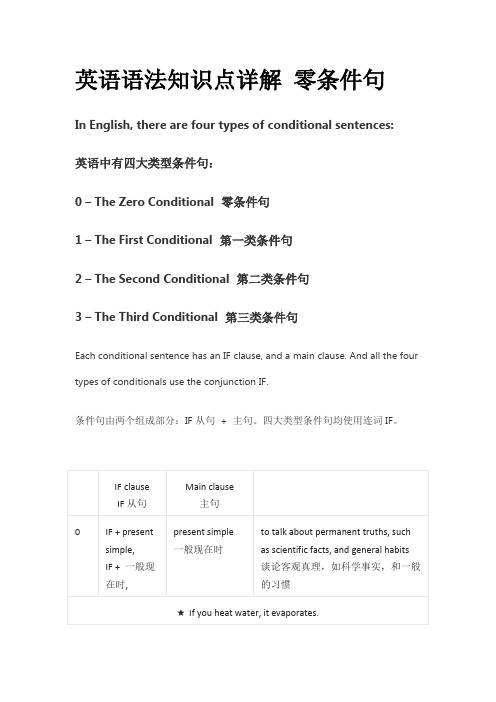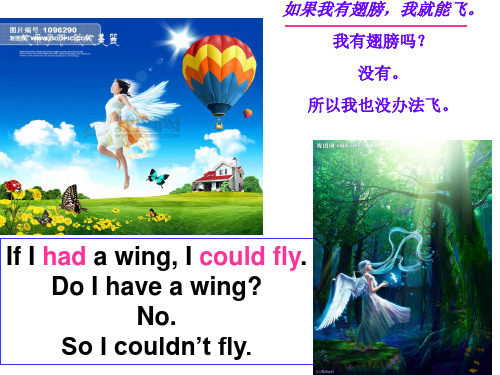初中英语语法if条件句first-conditional
- 格式:ppt
- 大小:760.50 KB
- 文档页数:6

英语专项语法时态13条件句之第一条件讲解+练习+答案firstconditionalFirst Conditional第一条件句主谓模块If it rains, I won't go to the park.如果下雨,我就不去公园了。
If I have enough money, I'll buy some new books.如果我有足够的钱,我就买些新鞋。
She'll be late if the train is delayed.如果火车晚点,她会迟到的。
She'll miss the bus if she doesn't leave soon.如果她不快点走,她会赶不上公共汽车的。
If I see her, I'll tell her.如果我看到她,我会告诉她。
用法总结The first conditional is used to talk about things which might happen in the future. Of course, we can't know what will happen in the future, but this describes possible things, which could easily come true.第一条件句用来谈论将来可能发生的事情。
当然,我们不知道将来会发生什么,但这描述了可能发生的事情,这些事情很容易实现。
First vs. Zero Conditional:第一条件句vs.零条件句:The first conditional describes a particular situation, whereas the zero conditional describes what happens in general.第一条件句描述了一个特定的情况,而零条件句描述了一般情况下发生的事情。

英语中的条件句英语条件句有时被称为“if 从句”,分为真实条件句和非真实条件句,它们描述了可能发生(现在或将来)或可能发生但没有发生(过去)的事情的结果,由不同的时态组成,主要有四种条件句:零条件句、第一类条件句、第二类条件句和第三类条件句。
一、零条件句(Conditional 0/Present Real Conditional)1. 格式:If/When + …一般现在时…,…一般现在时…2. 用法:当结果总是发生时或绝对真理时使用零条件句,属于真实条件句,比如如果水达到100度,它总是沸腾,例如:If water reaches 100 degrees, it boils.如果水达到100度,就会沸腾。
If people eat too much, they get fat.如果人们吃得太多,就会发胖。
If you touch a fire, you get burned.如果你碰了火,你就会被烧伤。
People die if they don't eat.人不吃就会死。
You get water if you mix hydrogen and oxygen.如果你把氢和氧混合,你就会得到水。
Snakes bite if they are scared.蛇收到惊吓就咬人。
If babies are hungry, they cry.如果婴儿饿了,他们会哭。
If I eat peanuts, I am sick.如果我吃花生,我就生病。
解析:这只对我来说是真的,也许不是对每个人都是这样,但每次吃花生我都会生病,因此也属于零条件句。
If the weather is nice, she walks to work.如果天气好,她就步行去上班。
解析:这只对她来说是真的,也许不是对每个人都是这样,但每次天气好,她就会步行去上班,因此也属于零条件句。
Jerry helps me with my homework when he has time.杰瑞有时间时帮我做作业。

英语语法知识点详解零条件句In English, there are four types of conditional sentences:英语中有四大类型条件句:0 – The Zero Conditional 零条件句1 – The First Conditional 第一类条件句2 – The Second Conditional 第二类条件句3 – The Third Conditional 第三类条件句Each conditional sentence has an IF clause, and a main clause. And all the four types of conditionals use the conjunction IF.条件句由两个组成部分:IF从句+ 主句。
四大类型条件句均使用连词IF。
The IF clause gives us the condition or situation, and the main clause gives us the result. The Zero and the First Conditional express real or possible conditions and results. The Second and the Third Conditional express impossible, hypothetical, unreal conditions and results.IF从句提供条件或情况,主句描述产生的结果。
零条件句和第一类条件句描述真实或可能发生的条件和结果。
第二类条件句和第三类条件句描述不可能发生的、假设的、不真实的条件和结果。
With all conditional sentences, the order of these clauses is not fixed. So, you can swap them around. And even when you change the order of the clauses, the meaning is the same. In writing, if your IF clause comes first, add that comma. If your main clause comes first, you don’t need a comma.在所有类型的条件句中,IF从句和主句的顺序可以互换。

if引导的条件状语从句总结(精)if引导的四种条件状语从句一、零条件句/绝对真实条件句(Zero Conditional)零条件句,又叫绝对真实条件句,用于阐述事实。
用来表达在该条件下,结果一定会如此(如规则,客观规律、真理等)。
结构是:If+主语+do/does,主语+do/does。
其从句和主句的谓语动词通常为一般现在时。
二、第一条件句/相对真实条件句(First Conditional)第一条件句又叫相对真实条件句,谈论将来可能发生的事情,并考虑这件事情的结果。
强调偶然性或一次性的条件,也可以与绝对真实条件句同义。
if从句用一般现在时或其他现在时,表示将来可能发生的事情(条件);主句用一般将来时,表示这件事情的结果。
结构是:If+主语+do/does,主语+will do。
三、第二条件句/现在虚拟条件句(Second Conditional)第二条件句是虚拟条件句的一种,即现在虚拟条件句(Unreal Present),用来表达在现在或将来时间下不太可能或不可能发生的条件,这种条件句还可以用来表示试探性的、委婉的语气(可以理解为不大有自信,所以不太真实的条件)。
结构是:①与将来事实相反的非真实条件句是If+主语+should do/were to do/did,主语+would/should/could/might do;②与现在事实相反的非真实条件句是If+主语+did,主语+would/should/could/might+do。
四、第三条件句/过去虚拟条件句(Third Conditional) 第三条件句是表示与过去事实相反的虚拟语气,是用来表达如果(If)当时那样发生,另外一方面(当时)结果会如何。
通常是指过去的事情,带有一切已经太迟而不能够补救的意思。
结构是:If+主语+had done,主语+would/should/could/ might+have done。
if 条件句的时态搭配1.if从句用一般现在时,主句用一般将来时2.if从句用一般现在时,主句用may/might/canIf the fog gets thicker the plane may/might be diverted.3.if从句用一般现在时,主句用must/shouldIf you want to lose weight you must/should eat less bread.4.if从句用一般现在时,主句用一般现在时5.if从句用现在进行时,主句用一般将来时6.if从句用现在完成时,主句用一般将来时If you have finished dinner I’ll ask the waiter for the bill.。


用if引导的条件状语从句15个如果引导的条件状语从句是英语语法中非常常见的句型,用于表达某种条件下发生的情况。
下面将介绍15个以if引导的条件状语从句的相关内容。
1. **Zero Conditional**Zero conditional用于表达普遍真理或习惯性的动作,结构为if + 现在时,现在时。
例如:If you heat water to 100 degrees, it boils.2. **First Conditional**First conditional用于表达将来可能发生的事情,结构为if + 现在时,将来时。
例如:If it rains tomorrow, we will stay indoors.3. **Second Conditional**Second conditional用于表达与现在事实相反的假设,结构为if + 过去时,would/could/might + 原形动词。
例如:If I were rich, I would travel around the world.4. **Third Conditional**Third conditional用于表达与过去事实相反的假设,结构为if + 过去完成时,would/could/might + have + 过去分词。
例如:If I had studied harder, I would have passed the exam.5. **Mixed Conditional**Mixed conditional结合了第二和第三条件句的结构,用于表达过去的假设对现在的影响,或现在的假设对过去的影响。
例如:If I had known you were coming, I would have baked a cake.6. **Unless**Unless的意思是“除非”,引导的条件状语从句表示否定条件。
结构为unless + 句子,相当于if not。
if虚拟语句的用法。
if虚拟语句,也称为条件句,用于表达与事实相反的假设、虚拟和不可能实现的愿望。
在英语中,if虚拟语句通常有三种形式:第一型虚拟、第二型虚拟和第三型虚拟。
1、第一型虚拟(Present Unreal Conditional):
结构:If + 现在时态动词,主句将来时态动词。
例句:If I had time, I would go to the party.(如果我有时间,我会去参加聚会。
)
2、第二型虚拟(Past Unreal Conditional):
结构:If + 过去时态动词,主句过去完成时态动词。
例句:If I had studied harder, I would have passed the exam.(如果我学习更努力,我就能通过考试了。
)
3、第三型虚拟(Past Perfect Unreal Conditional):
结构:If + 过去完成时态动词,主句将来完成时态动词。
例句:If she had known the truth, she would have told us.(如果她知道了真相,她会告诉我们的。
)。
First Conditional第一条件句主谓模块➜ If it rains, I won't go to the park.如果下雨,我就不去公园了。
➜ If I have enough money, I'll buy some new books.如果我有足够的钱,我就买些新鞋。
➜ She'll be late if the train is delayed.如果火车晚点,她会迟到的。
➜ She'll miss the bus if she doesn't leave soon.如果她不快点走,她会赶不上公共汽车的。
➜ If I see her, I'll tell her.如果我看到她,我会告诉她。
用法总结The first conditional is used to talk about things which might happen in the future. Of course, we can't know what will happen in the future, but this describes possible things, which could easily come true.第一条件句用来谈论将来可能发生的事情。
当然,我们不知道将来会发生什么,但这描述了可能发生的事情,这些事情很容易实现。
First vs. Zero Conditional:第一条件句vs.零条件句:The first conditional describes a particular situation, whereas the zero conditional describes what happens in general.第一条件句描述了一个特定的情况,而零条件句描述了一般情况下发生的事情。
For example (zero conditional): if you sit in the sun, you get burned (here I'm talking about every time a person sits in the sun - the burning is a natural consequence of the sitting)例如(零条件句):如果你坐在阳光下,你就被灼伤。
透析if引导的四种条件状语从句作者:王玉峰来源:《青苹果·高一版》2016年第11期英语中的if条件句由两部分组成,一个是连词if引导的条件状语从句,一个是表示结果的主句,if从句可置于主句之前或之后。
主从句的谓语动词的时态形式取决于说话者认为结果是否是真实的。
if条件句分为零条件句、第一条件句、第二条件句和第三条件句四种,见下表(The 4 Types of Conditionals):下面以动词do为例分别讲解if引导的四种条件状语从句。
一、零条件句/绝对真实条件句(Zero Conditional)零条件句,又叫绝对真实条件句,用于阐述事实。
用来表达在该条件下,结果一定会如此(如规则,客观规律、真理等)。
结构是:If+主语+do/does,主语+do/does。
其从句和主句的谓语动词通常为一般现在时。
如:If ice is heated,it melts.如果冰被加热,就融化了。
(表示科学理论的条件句)If you heat water,it boils. 如果你烧水,水会开。
(表示科学理论的条件句)If the temperature drops to 0 ℃,water freezes. 如果温度降至零摄氏度,水就会结冰。
(表示科学理论的条件句)If I am late for training,my coach gets angry. 如果我培训迟到了,我的教练会很生气。
(表示客观事实的条件句)Im happy to go to the party if you come with me.如果你和我一起,我就愿意去参加晚会。
(意思是你去我才去)(表示客观事实的条件句)In time of serious accidents,if we know some basic things about first aid,we can save lives. 在严重事故的时候,如果我们了解一些基本的急救常识,我们可以挽救生命.(表示客观事实的条件句)If I felt any doubt,I always asked my teachers. 我一有了疑惑,总要问我的老师。